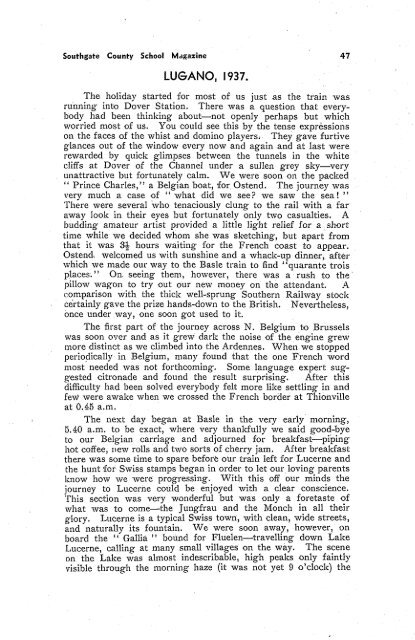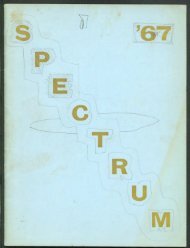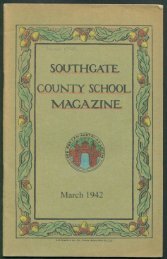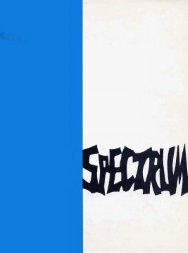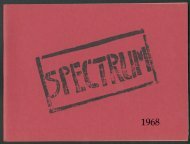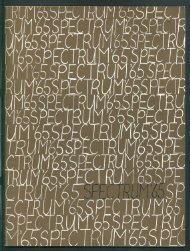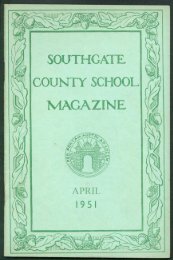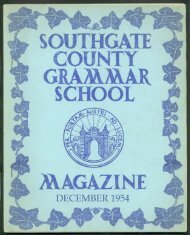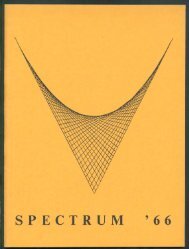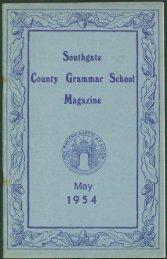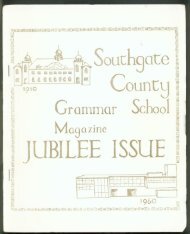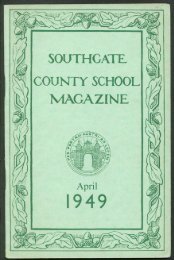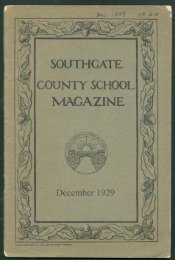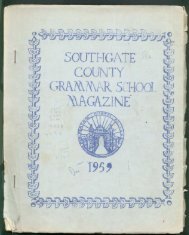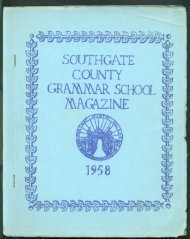No 34 - December 1937 - Southgate County School
No 34 - December 1937 - Southgate County School
No 34 - December 1937 - Southgate County School
You also want an ePaper? Increase the reach of your titles
YUMPU automatically turns print PDFs into web optimized ePapers that Google loves.
<strong>Southgate</strong> <strong>County</strong> <strong>School</strong> Magazine 47<br />
LUGANO, <strong>1937</strong>.<br />
The holiday started for most of us just as the train was<br />
running- into Dover Station. There was a question that everybody<br />
had been thinking about—not openly perhaps but which<br />
worried most of us. You could see this by the tense expressions<br />
on the faces of the whist and domino players.- They gave furtive<br />
glances out of the window every now and again and at last were<br />
rewarded by quick glimpses between the tunnels in the white<br />
cliffs at Dover of the Channel under a sullen grey sky—very<br />
unattractive but fortunately calm. We were soon on the packed<br />
" Prince Charles," a Belgian boat, for. Ostend. The journey was<br />
very much a case of '' what did we see ? we saw the sea! ''<br />
There were several who tenaciously clung to the rail with a far<br />
away look in their eyes but fortunately only two casualties. A<br />
budding amateur artist provided a little light relief for a short<br />
time while we decided whom she was sketching, but apart from<br />
that it was 3ij? hours waiting for the French coast to appear.<br />
Ostend welcomed us with sunshine and a whack-up dinner, after<br />
which we made our way to the Basle train to find "quarante trois<br />
places." On seeing them, however, there was a rush to the'<br />
pillow wagon to try out our new money on the attendant. A<br />
comparison with the thick well-sprung Southern Railway stock<br />
certainly gave the prize hands-down to the British. Nevertheless,<br />
once under ,way, one soon got used to it.<br />
The first part of the journey across N. Belgium to Brussels<br />
was soon over and as it grew dark the noise of the engine grew<br />
more distinct as we climbed into the Ardennes. When we stopped<br />
periodically in Belgium, many found that the one French word<br />
most needed was not forthcoming. Some language expert suggested<br />
citronade and found the result surprising. After this<br />
difficulty had been solved everybody felt more like settling in and<br />
few were awake when we crossed the French border at Thionville<br />
at 0.45 a.m.<br />
The next day began at Basle in the very early morning,<br />
5.40 a.m. to be exact, where very thankfully we said good-bye<br />
to our Belgian carriage and adjourned for breakfast—piping<br />
hot coffee, new rolls and two sorts of cherry jam. After breakfast<br />
there was some time to spare before our train left for Lucerne and<br />
the hunt for Swiss stamps began in order to let our loving parents<br />
know how we were progressing. With this off our minds the<br />
journey to Lucerne could be enjoyed with a clear conscience.<br />
This section was very wonderful but was only a foretaste of<br />
what was to come—the Jungfrau and the Monch in all their<br />
glory. Lucerne is a typical Swiss town, with clean, wide streets,<br />
and naturally its fountain. We were soon away, however, on<br />
board the " Gallia " bound for Fluelen—travelling down Lake<br />
Lucerne, calling at many small villages on the way. The scene<br />
on the Lake was almost indescribable, high peaks only faintly<br />
visible through the morning haze (it was not yet 9 o'clock) the


